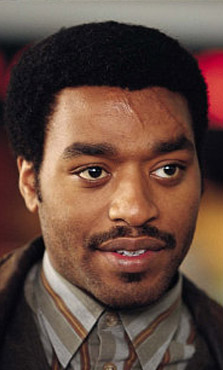 The currency of the secret economy in “Dirty Pretty Things” is human flesh, but the film is really about souls passing through a spiritual way-station that happens to be called South London. The criminal underworld in the film takes on the dimensions of a mythical Purgatory, and Guo Yi, the rational hospital porter who befriends Okwe, is its Virgil. He tells of spirits passing from dead bodies into the next world, and mentions to Ivan the hotel doorkeeper that he, Ivan, is like the ferryman of Hades arranging passage into the underworld. Such a passage has a heavy price attached, but it can be a round trip—for a heavier price, which becomes the locus of a story brimming with surprising poetry. The characters must learn the London underground’s terrifying and inescapable logic—survive at all costs. The currency of the secret economy in “Dirty Pretty Things” is human flesh, but the film is really about souls passing through a spiritual way-station that happens to be called South London. The criminal underworld in the film takes on the dimensions of a mythical Purgatory, and Guo Yi, the rational hospital porter who befriends Okwe, is its Virgil. He tells of spirits passing from dead bodies into the next world, and mentions to Ivan the hotel doorkeeper that he, Ivan, is like the ferryman of Hades arranging passage into the underworld. Such a passage has a heavy price attached, but it can be a round trip—for a heavier price, which becomes the locus of a story brimming with surprising poetry. The characters must learn the London underground’s terrifying and inescapable logic—survive at all costs.
Their innocence long lost, to escape with a modicum of dignity is their only remaining hope. Okwe, the Nigerian exile who works two jobs and chews Canna-like roots to ward off sleep, is a lotus-eater in this land of the undead. Full of weary, wounded aplomb supplied by the superb Chiwetel Ejiofor, Okwe is never at ease in the deterministic world in which he finds himself stranded, but, though he is constantly alert to the prospects of escaping it, he finds himself caught in a trancelike inertia.
Thrown together with Senay, a doe-eyed Turkish woman played by the adorable Audrey Tautou, they form a plausible pairing of frightened immigrants living hand to mouth. Their romantic chemistry is obvious from the first time they appear onscreen together, but they cannot abandon their hunted wariness long enough to dissolve into a typical love affair. Only when they are finally moving on can they reveal the yearning in their hearts.
The film’s social commentary could easily have ventured into Dreiserian ground, but its criticism of the crushing power structure that grinds down its captives is whispered rather than shouted, a choice that gives the film an understated power that preserves its insomniac or narcotic tone. Besides a quick exchange between Okwe and a white kidney merchant near the end of the film (“We are the people you do not see”), there is no sermonizing. The reality of sweat shops, illegal immigrants, third world exiles, ruthless schemers and black marketers preying on the helpless is not exposed in itself but reflected in the agonizing choices Okwe and Senay must make. The stygian valley through which they travel is recorded faithfully and unsentimentally, and that is all the commentary “Dirty Pretty Things” requires.
In further deepening the story’s emotional core, director Stephen Frears and writer Stephen Knight have given their characters a fallibility that creates sympathy as well as keeps us guessing as to what choices they’ll make next. By turns Okwe and Senay are idealistic and cynical. In one scene he recites a hopeful mantra, “Work hard and save your money and you will get to New York”, and in another he tells Senay that looking ahead is useless, and only survival matters. For her part, Senay fights back at the pernicious forces arrayed against her, but it’s only for a moment. Soon she, like Okwe, must bend under the weight of her deplorable powerlessness.
Frears builds thriller-like tension in “Dirty Pretty Things” by using the plot to dangle binary absolutes of character, pure and impure, before our eyes. We know Okwe and Senay will fall into sin, but we hope that eventually the stain can be washed away by grace. “What is dirty the night before, we clean, and then in the morning it is pretty again”, Sneaky tells Okwe. Yet the film’s difficult, heart-wringing conclusion reveals another possibility: innocence and experience coexisting in a human being, a person both “dirty and pretty”. This approaches a genuine truth of life that even films of larger scope and ambition rarely dream of, let alone realize. Okwe and Senay are ennobled not because they escape their purgatory unscathed, but because they have paid the ferryman his due. Broken and triumphant, they emerge fully human. |